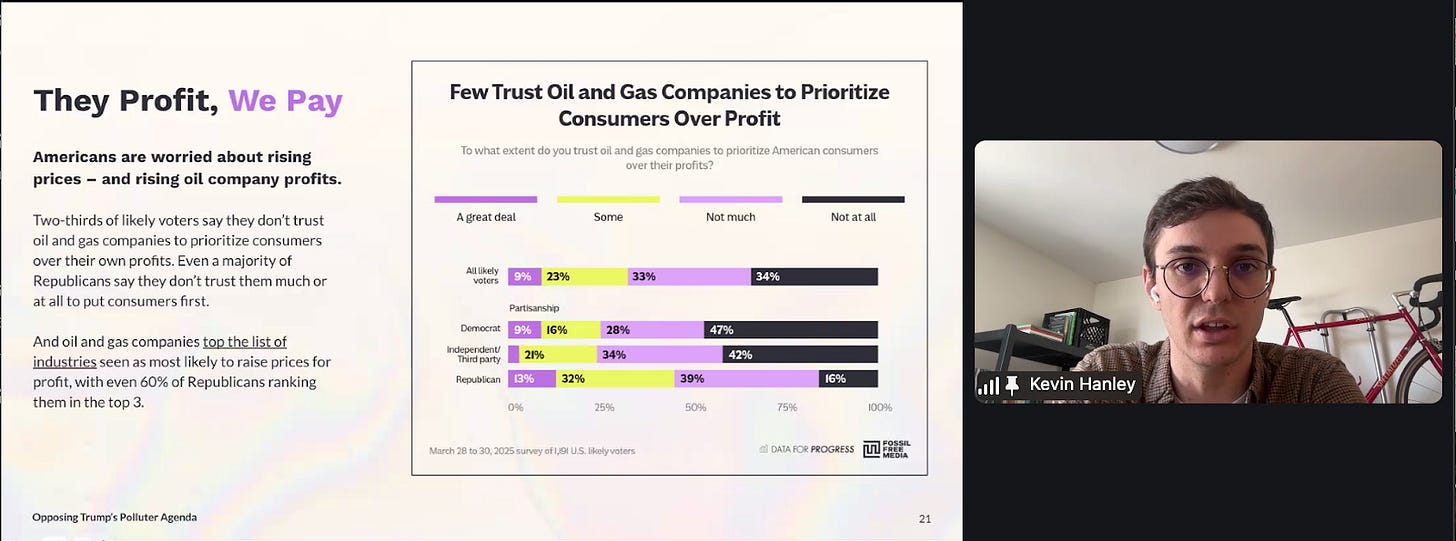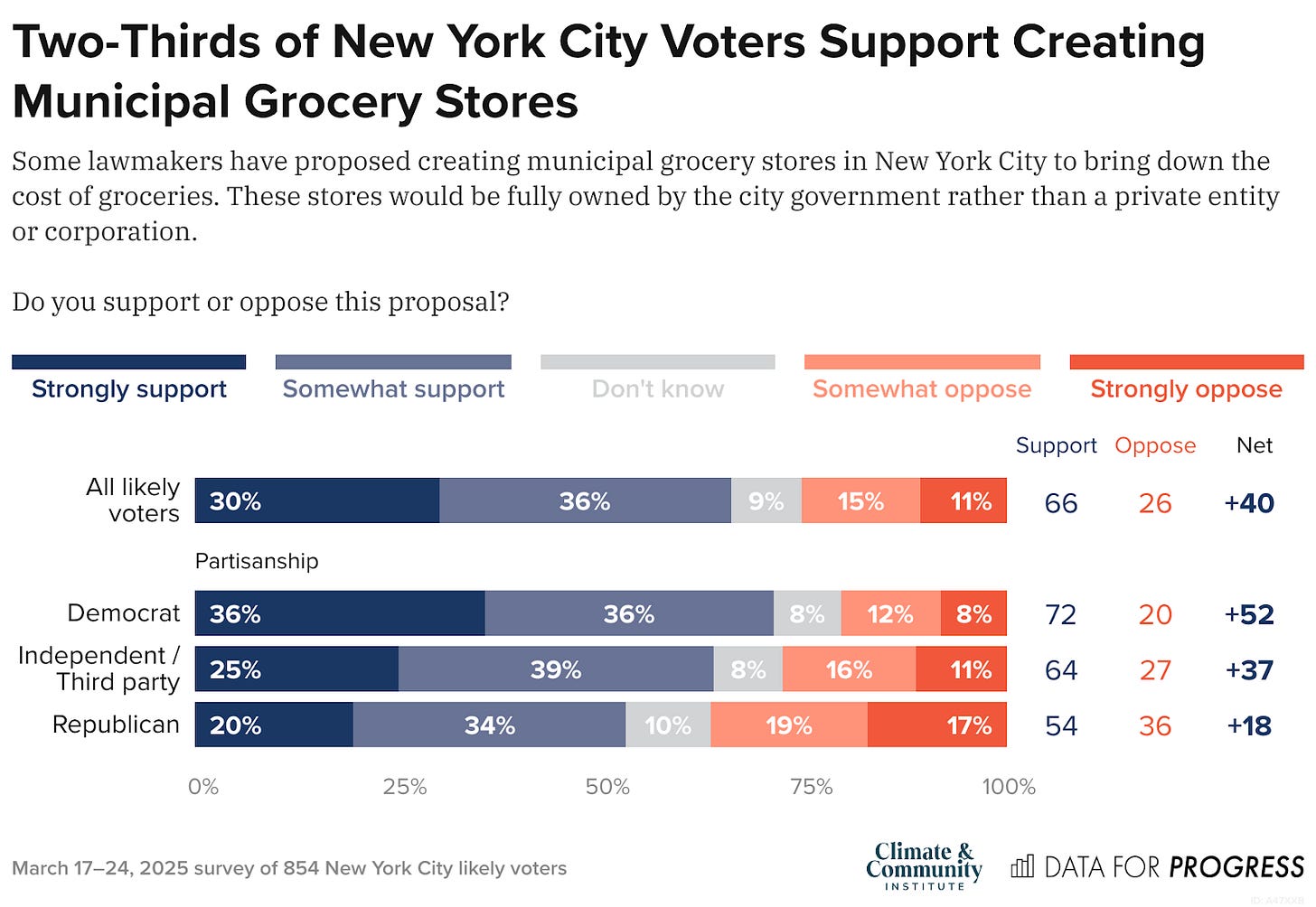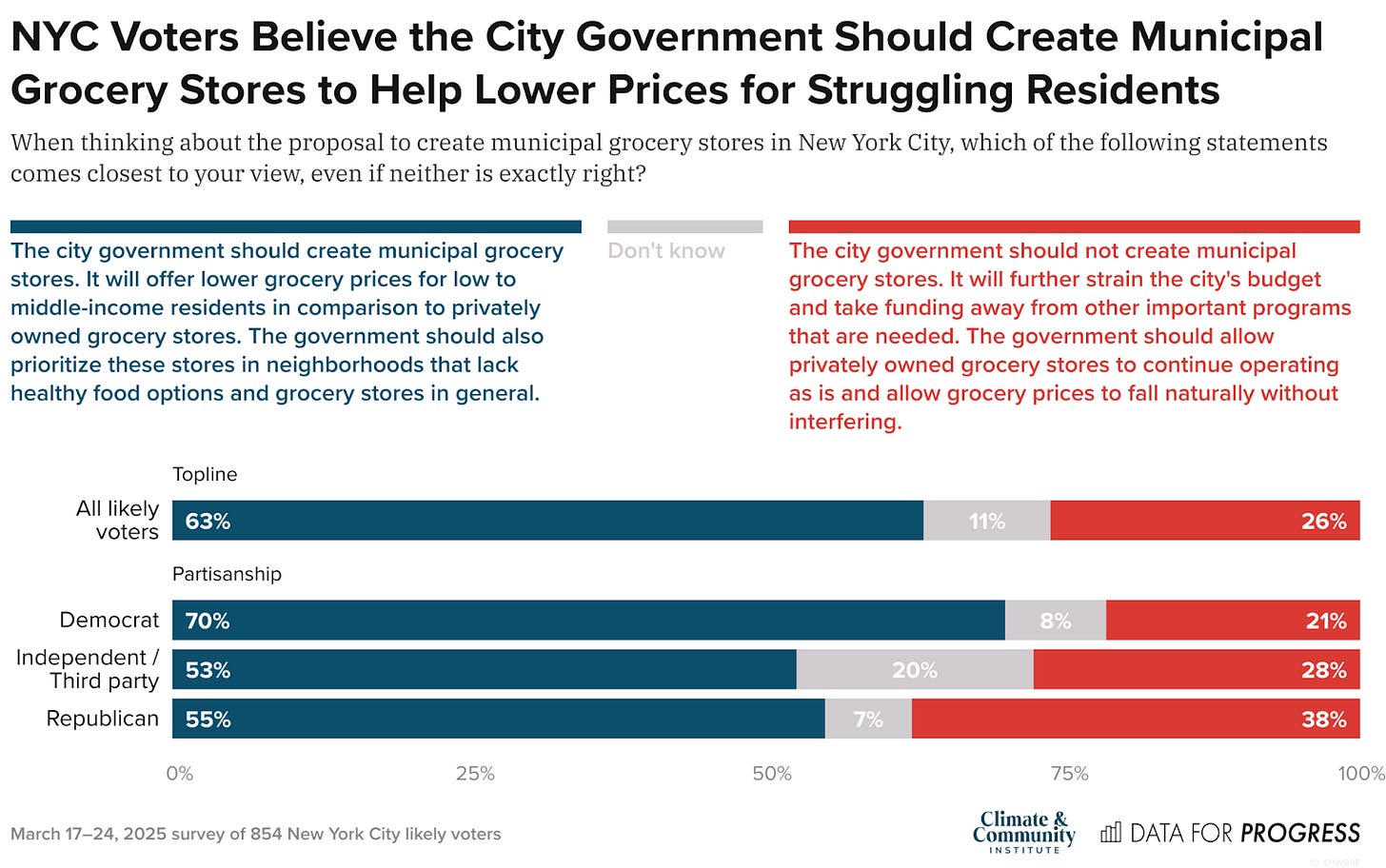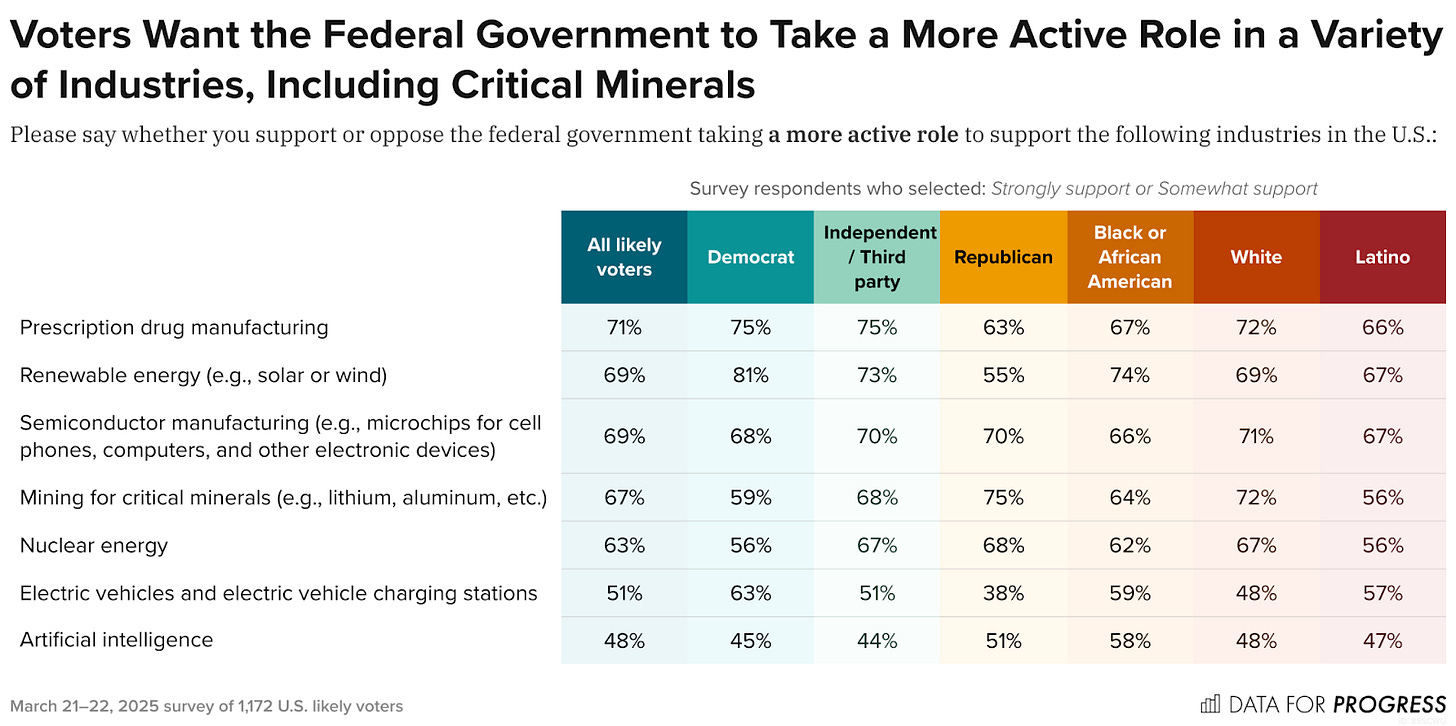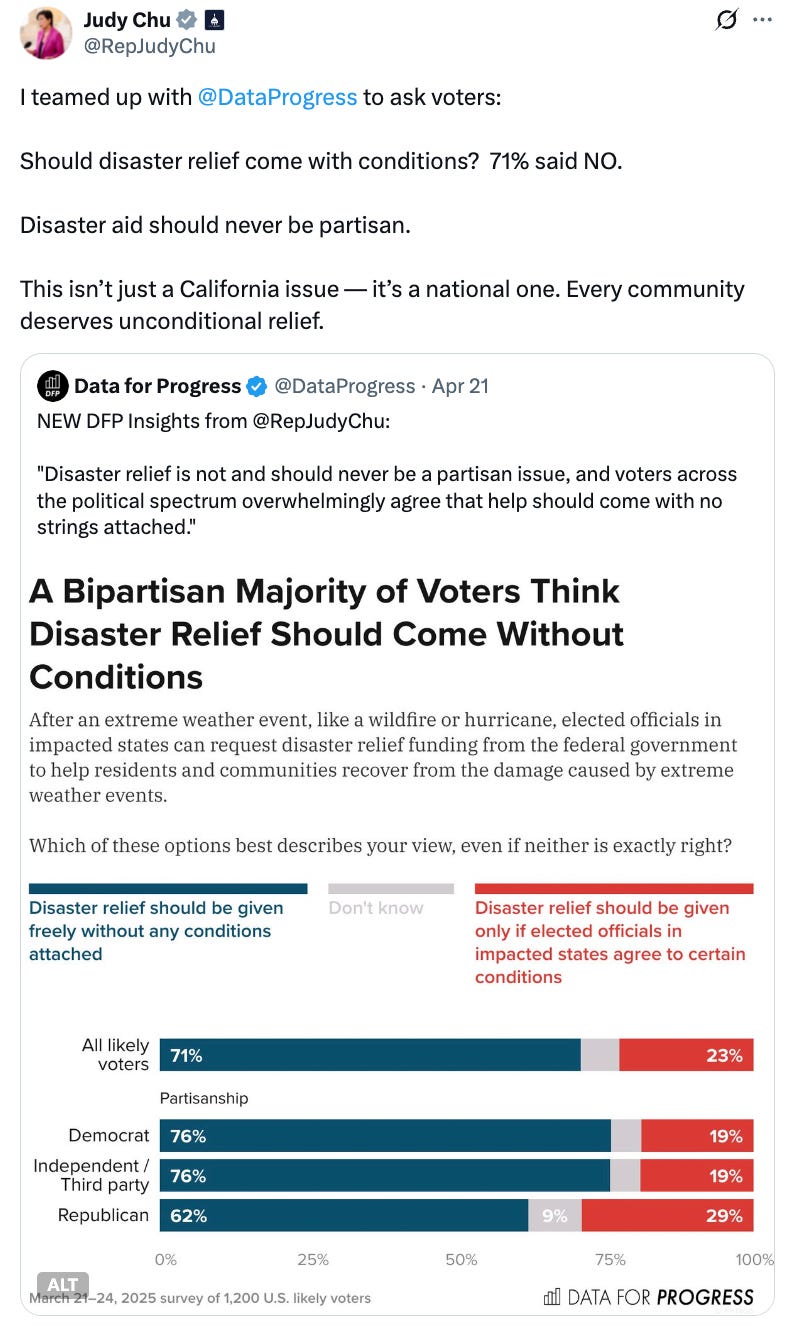LIHEAP Lovers Unite
Welcome back to Data for Climate Progress — your one-stop shop for all things climate at Data for Progress.
Welcome back to Data for Climate Progress — your one-stop shop for all things climate at Data for Progress. Catch us here every month for our latest climate polling, juicy insights, and can’t-miss reading lists.
As always, we’d love to hear from you — drop us (Grace Adcox and Catherine Fraser) a line at gracea@dataforprogress.org and catherine@dataforprogress.org. Forwarded this email? You can subscribe below.
New here? We are excited to see so many new subscribers tuning in to this newsletter. Each month, we share the DFP climate team’s ongoing research and collaborations with our partners in the climate movement.
Are there things you like or want to see more of in this newsletter? Send us a note.
LIHEAP Is a Lifeline for More Than 6 Million American Families
Earlier this month, the Trump administration’s Department of Health and Human Services gutted the Low Income Home Energy Assistance Program (LIHEAP) by laying off all 23 staffers charged with overseeing the program. Created in 1981 in response to the U.S. energy crises of the 1970s, LIHEAP currently helps more than 6 million low-income American families afford their energy bills. LIHEAP has long enjoyed bipartisan support in Congress, and, according to a new poll from DFP, voters support it, too. In fact, a strong bipartisan majority of voters (75%) support LIHEAP, including 84% of Democrats, 74% of Independents, and 68% of Republicans.
Voters Reject Trump’s Free Pass to Polluters
Since returning to office, President Donald Trump has wreaked havoc on more than 50 years of environmental and public health protections, including opening an outlandish new loophole where polluters can simply send an email to the U.S. Environmental Protection Agency (EPA) and request an exemption from Trump to pollute. Yes, you read that right: Industrial polluters can now just send an email requesting a free pass from following the Clean Air Act, and the president himself will decide based “on the merits” if they get one. But Trump’s deregulatory actions don’t happen in a vacuum — they have very real and harmful impacts on Americans all over the country, and especially those who live near or along the fenceline of industrial facilities, like many Houstonians. New polling from Data for Progress and Air Alliance Houston finds that a majority of voters (68%) are concerned by these repeals and don’t support EPA’s new “just email Trump” loophole. In fact, after being informed that companies are now allowed to email Trump to request an exemption, a strong bipartisan majority of voters (69%) say that all companies should be required to follow air pollution rules required by the Clean Air Act. Read our new Insights piece with Air Alliance Houston here.
As Earth Day Turns 55, Voters Say the U.S. Is Already Experiencing the Effects of Climate Change
New DFP polling reveals a clear disconnect between public opinion and the Trump administration’s aggressive environmental deregulation. A slim majority of likely voters (52%), including 72% of Democrats and 61% of Independents, say the federal government is on the wrong track with its environmental actions. Notably, a majority of voters (56%) believe the U.S. is already experiencing the effect of climate change, and 78% overall think that the U.S. will experience the effects of climate change at some point now or in the future. Voters also think these impacts will be felt locally, with 68% expecting it to “somewhat” or “greatly” affect their local areas. Still, even though voters recognize the severity of climate change, they remain optimistic that we can still address it: 75% of voters believe it’s not too late to reverse environmental harm. Read the full brief here.
Rep. Chu: Voters Across Party Lines Agree That Disaster Relief Should Come With No Strings Attached
In response to Trump’s calls to condition aid to California in the aftermath of the wildfires that impacted her district earlier this year, California’s Rep. Judy Chu joined the DFP Insights page to call on Congress to continue distributing disaster aid to states without placing conditions on that aid. Voters agree with Chu: A DFP survey finds that, when asked to choose whether disaster relief should be given without strings attached or only if elected officials in impacted states agree to certain conditions, voters overwhelmingly choose the former (71% to 23%). Chu says it best, “Disaster relief is not and should never be a partisan issue, and voters across the political spectrum overwhelmingly agree that help should come with no strings attached.” Read the full Insights article here.
When Big Oil Profits, We Pay
Earlier this month, Data for Progress senior analyst Kevin Hanley shared new data from a survey, fielded with our partners at Fossil Free Media, showing that voters continue to support policies to make polluters pay for the costs of climate-related damages their products helped cause. More than 7 in 10 voters (71%), including 55% of Republicans, say they support requiring oil and gas companies to pay a share of the costs. As Big Oil tries to follow in the steps of Big Tobacco by seeking legal immunity from climate accountability legislation and litigation, a strong majority of voters (65%) oppose granting these companies immunity. These results affirm that voters strongly want to see accountability from those most responsible for accelerating climate change by making them pay up for climate-related damages. Read the full brief on the survey here.
New York City Voters Support Municipal Grocery Stores as Much as They Support This Knicks Playoff Run
By Tenneth Fairclough II
Coming out of the presidential election last year, our data showed that voters swung to Trump because they were upset about inflation impacting the prices of everyday products, from utilities to groceries. In the aftermath, Democrats are also still trying to figure out how to effectively win back and engage working-class Americans. Well, in New York City, there is one prominent policy that voters back to help ease inflation and it could be a winning message: the creation of municipal grocery stores throughout the five boroughs. Data for Progress and Climate and Community Institute surveyed 854 likely voters in New York City to assess whether they support or oppose this policy proposal, and why. More than two-thirds of voters (66%) support the creation of municipal grocery stores, including 72% of Democrats, 64% of Independents, and 54% of Republicans.
Why do NYC voters support municipal grocery stores as much as their New York Knicks, you may ask? A majority of respondents (63%) believe they will offer low- to middle-income families lower grocery prices compared with private grocery stores, and also believe the government should prioritize these public stores in neighborhoods that lack healthy food options.
Look, this isn’t rocket science! If Democrats want a winning message to bring working-class voters back into the party’s fold, they should take a lesson from what New York City voters are saying: Prioritize and pass policies, both on the national and local level, that will assist us through the cost-of-living crisis! Read our brief here and Climate and Community Institute’s post here.
Unearthing Public Opinion on Expanding Domestic Critical Mineral Production
By Eva Brungard, Grace Adcox, and Catherine Fraser
In the name of national security and in service of the clean energy transition, the United States has increasingly focused on reducing its dependence on foreign supply chains, including sources of energy transition minerals, often called critical minerals. Critical minerals, like lithium or silicon, have been deemed essential to the manufacturing of clean energy technologies, national defense systems, and other high-tech sectors, but are subject to supply risks. With limited domestic mining capacity, the U.S. is 100% import-reliant on 12 of the 50 designated critical minerals.
In response, the Trump administration has announced intentions to expand mineral production on public lands at the expense of other land uses such as recreation, conservation, or Indigenous stewardship, as well as plans to “acquire” Greenland and Canada, and trade Ukrainian security for exclusive mineral rights. While rhetoric about the need for U.S. dominance in critical mineral production has notably escalated under the current administration, as political scientist Thea Riofrancos points out, it is important to recognize that Trump’s recent policy actions on so-called critical minerals follow a long legacy of neocolonial exploitation and resource extraction pursued by past administrations, both Democratic and Republican. Riofrancos further argues that, by labeling these minerals as “critical,” the U.S. has justified extraction and deregulation while sidestepping international cooperation.
Meanwhile, China — which produces 40% of global copper, 59% of lithium, and 73% of cobalt — has suspended rare earth mineral exports to the U.S. Prior to China’s announcement, Data for Progress surveyed 1,172 likely voters to understand public attitudes toward critical mineral mining in the U.S. The findings reveal a majority of voters across party lines believe expanding domestic critical mineral production is important, with few voters saying they would oppose a new mine in the U.S. under any circumstances. However, voters express concern about the environmental and public health impacts of mining and want to ensure local communities will not be harmed by these projects.
When asked if the federal government should take a more active role in the mining of critical minerals, 67% of voters support greater involvement, including 59% of Democrats, 68% of Independents, and 75% of Republicans.
To better understand opposition toward a new mine, DFP asked respondents to identify their top concern. Voters are most concerned about the environmental impact of a mine (24%), followed by the public health impacts (15%), mining operations being owned by foreign companies or used in foreign products (12%), and land reclamation after a mining operation ends (12%).
Overall, voters recognize the importance of critical minerals to domestic manufacturing and the clean energy transition, though they have concerns regarding the environmental and public health impacts of a new mine. Thus, any expansion of domestic mineral extraction must come with strong social, environmental, and public health safeguards. Alternatives like critical mineral recycling, reducing vehicle dependency, and right-sizing to smaller EV batteries can also shrink demand for critical minerals and minimize the need for new mining and extraction. Read the full report here.








